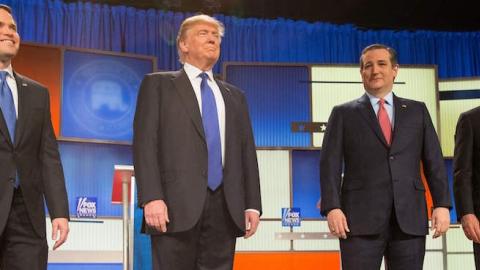Amid the incessant talk of Trump “inevitability," voters' verdicts seem to be telling a rather different story. For the week including "Super Tuesday" and "Super Saturday," Donald Trump won 300 delegates (40 percent of the 750 delegates allotted across those 15 states and Puerto Rico), while Ted Cruz won 283 delegates (38 percent). In other words, Cruz won 94 percent as many delegates during "Super Week" as Trump did.
Marco Rubio won 135 delegates during the week (18 percent of the week's total), and John Kasich won 29 delegates (4 percent). Ben Carson, now out of the race, won 3 delegates (0.4 percent).
On "Super Saturday" alone, Cruz won more delegates than Trump did—69 to 53 (with 5 delegates from Louisiana still to be allotted).
Trump's percentage of the vote for the week doesn't make him appear any more inevitable than his delegate tally does. For the week, Trump won 35 percent of the vote, Cruz 30 percent, Rubio 22 percent, and Kasich 7 percent. (Other candidates, mostly Carson, won the remainder.)
Granted, the week featured a primary in Cruz's home state of Texas, an obvious advantage for the Texas senator. But in addition to winning the Lone Star State by an impressive 17 points, Cruz—who got more votes than Rubio even outside of Texas—also won Oklahoma, Alaska, Kansas, and Maine. In addition, he beat Trump in Minnesota (which Rubio won) and finished within less than 5 percentage points of him in Arkansas, Kentucky, and Louisiana.
In the week's 15 states, Trump collected 9 gold medals (for first-place finishes) and 5 silvers (for second-place finishes), Cruz won 5 golds and 6 silvers, Rubio won 1 gold and 2 silvers (plus his win in a territory), and Kasich won 2 silvers.
All in all, through the first 19 states (leaving 31 to go, of course) and Puerto Rico, Trump won 34 percent of the vote to Cruz's 29 percent, Rubio's 21 percent, Kasich's 7 percent, and other candidates' 9 percent. Across those 19 states and one territory, Trump won 44 percent of the delegates to Cruz's 34 percent, Rubio's 17 percent, Kasich's 4 percent, and other candidates' 1 percent.
There has been a lot of talk that if Trump wins both Florida and Ohio (both winner-take-all states) a little over a week from now, he'll then be "unstoppable." But if one were to add in all of Florida's and Ohio's delegates to Trump's tally now, giving him 14 wins in the first 21 states, he would still have won only 53 percent of the delegates to date—meaning he'd still have to win about 48 percent of the delegates across the remaining 29 states.
Why would anyone think it's inevitable that Trump would be able to do so? Especially since the same people who make this claim have generally been saying that the best way to stop Trump is to get the race down to two candidates. Across most of those 29 states (22 of them, to be exact), a two-candidate race is presumably what they'd have.

















